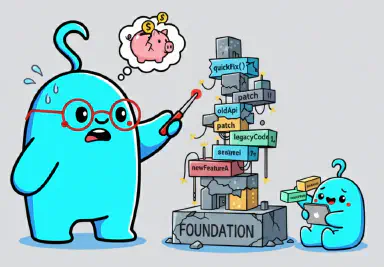
Is everything here correct? Most likely not but do let me know if you think differently. Healthy discourse creates deeper understanding after all.
To leadership: Why you aren’t the expert on process development
A bold statement – trust me I know. Why am I saying this? Let us look at it from our background. Yes, yours too.
When was the last time you did the job which processes you are looking to change? Was it last week, month, year or longer ago?
Also, it is worth noting that things do change with accelerating speed. New software to solve problems that didn’t exist last year are coming to the market all the time.
Understanding that you can’t stay up to date with all of them is the first step. For change to happen on a fundamental level it is crucial to involve those doing the actual work into the change process. They are the experts and you are the facilitator in change.
Forced change does not work
When was the last time a change was forced on you by someone else? Did you enjoy that situation? I bet not and that has not changed ever for humans.
If forced to change people tend to fight against it and they are looking to find every single issue why it doesn’t work. No matter how small they will bring it up.
Doesn’t sound like the most alluring way to go about change, right?
Have experts involved in change
Who are the experts? Not external consultants but the people doing the job who know the ins and outs of it (in far majority of the cases). They know which things are a nuisance which are necessary, and which aren’t.
You can involve them in multiple ways: interviews, workshops, surveys, etc. Main point is to have them involved and make them feel they have a say. Since they absolutely should have.
Suggest changes
When you have involved all parties and mapped out the actual process with your methods. (I recommend event storming workshops to be one of them to have transparency throughout the process from multiple angles.)
Give out a suggestion of what the new process could be. What can be automated, what cannot, etc. Tie all your suggestions to things you have been told.
Ask and expect feedback. Remove your ego from here and find a common ground from where you can start.
Going about change
Don’t try to revamp the whole process at once. It is often too big of a change for people to adapt to. Better to have change to be constant improvement. Little by little you can get the ball rolling.
Start with where with least effort you can do the biggest effect. This will have you gain even more trust by proving it is possible.
Simplicity is the key
Sounds simple, right? However, doing it in practice is a whole different thing. People try to do shortcuts or not communicate enough, etc. These all will erode trust. Also, nobody is perfect so always ask what could be better.
In short:
- You aren’t the expert
- Ask the experts (people doing the job)
- Suggest changes
- Ask for feedback all the time
- Communicate



